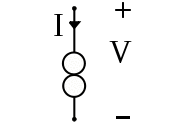
In electronics, a norator is a theoretical linear, time-invariant one-port which can have an arbitrary current and voltage between its terminals. A norator represents a controlled voltage or current source with infinite gain.[1]
Inserting a norator in a circuit schematic provides whatever current and voltage the outside circuit demands, in particular, the demands of Kirchhoff's circuit laws. For example, the output of an ideal opamp behaves as a norator, producing nonzero output voltage and current that meet circuit requirements despite a zero input.
A norator is often paired with a nullator to form a nullor.
Two trivial cases are worth noting: A nullator in parallel with a norator is equivalent to a short (zero voltage any current) and a nullator in series with a norator is an open circuit (zero current, any voltage).
References
- ^ Verhoeven C J M van Staveren A Monna G L E Kouwenhoven M H L & Yildiz E (2003). Structured electronic design: negative feedback amplifiers. Boston/Dordrecht/London: Kluwer Academic. pp. §2.2.1.1 pp. 30–32. ISBN 1-4020-7590-1.